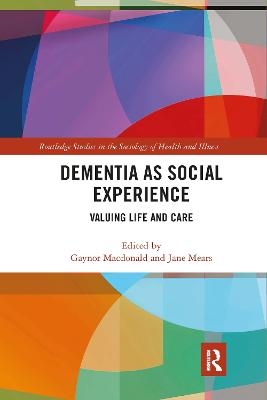
Dementia as Social Experience
Routledge (Verlag)
978-0-367-90264-3 (ISBN)
A diagnosis of dementia changes the ways people engage with each other – for those living with dementia, as well their families, caregivers, friends, health professionals, neighbours, shopkeepers and the community. Medical understandings, necessary as they are, provide no insights into how we may all live good lives with dementia.
This innovative volume brings together an interdisciplinary group of researchers and practitioners to focus on dementia as lived experience. It foregrounds dementia’s social, moral, political and economic dimensions, investigating the challenges of reframing the dementia experience for all involved. Part I critiques the stigmas, the negativity, language and fears often associated with a dementia diagnosis, challenging debilitating representations and examining ways to tackle these. Part II examines proactive practices that can support better long-term outcomes for those living with dementia. Part III looks at the relational aspects of dementia care, acknowledging and going beyond the notion of person-centred care. Collectively, these contributions highlight the social and relational change required to enhance life for those with dementia and those who care for them.
Engaging in a critical conversation around personhood and social value, this book examines the wider social contexts within which dementia care takes place. It calls for social change, and looks for inspiration to the growing movement for relational care and the caring society. Dementia as Social Experience is important reading for all those people who, in various ways, are living with dementia, as well as for those working in this area as clinicians, researcher and carers.
Gaynor Macdonald is a Social Anthropologist at the University of Sydney, Australia. Jane Mears is Associate Professor of Social Policy at Western Sydney University, Australia.
Chapter 1. Reframing Dementia. The Social Imperative
Part I. Challenging Social Constructions of Ageing and Dementia
Chapter 2. Negative Positioning of 'Dementia' in an Environment of Competition for Resources
Chapter 3. ‘Nobody Cares About Me’. Older Women, Caring and Dementia
Chapter 4. Feeling Invisible and Ignored. Families’ Experiences of Marginalisation Living with Younger Onset Dementia
Chapter 5. Generational Perceptions of Dementia in the Public Sphere. Public Health, Age-Othering and Generational Intelligence
Part II. Autonomy and Dignity
Chapter 6. Developing a Relational Approach to Decision-Making in Health Care Settings
Chapter 7. 'We've Always Thought of One Another'. Relational Perspectives on Autonomy and Decision-Making Among People with Dementia and Their Family-Carers
Chapter 8 Planning for the Rest-of-Life, Not End-of-Life. Reframing Advance Care Planning (ACP) for People with Dementia
Part III. Persons in Relationship. The Dynamics of Care
Chapter 9. The Critical Importance of Adopting a ‘Personhood Lens’ in Reframing Support and Care for Those with Dementia
Chapter 10. Emotional Labour, Person-Centred Care and Problem Solving in Regulating Dementia Care
Chapter 11. Why ‘Person-Centred’ Care is Not Enough. A Relational Approach to Dementia
| Erscheinungsdatum | 04.12.2019 |
|---|---|
| Reihe/Serie | Routledge Studies in the Sociology of Health and Illness |
| Zusatzinfo | 6 Tables, black and white |
| Verlagsort | London |
| Sprache | englisch |
| Maße | 156 x 234 mm |
| Gewicht | 453 g |
| Themenwelt | Studium ► Querschnittsbereiche ► Prävention / Gesundheitsförderung |
| Naturwissenschaften ► Biologie ► Humanbiologie | |
| Sozialwissenschaften ► Ethnologie | |
| Sozialwissenschaften ► Soziologie | |
| ISBN-10 | 0-367-90264-8 / 0367902648 |
| ISBN-13 | 978-0-367-90264-3 / 9780367902643 |
| Zustand | Neuware |
| Haben Sie eine Frage zum Produkt? |
aus dem Bereich


